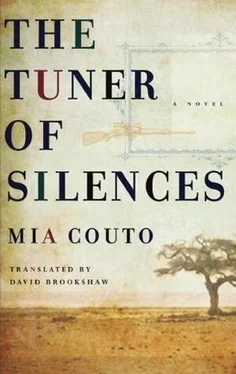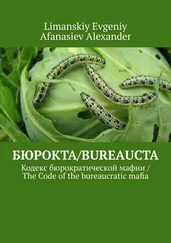— Well, go to bed then.
As a rule, he retired early, and didn’t stay up after sunset. We would accompany him to his room and line up while he settled himself in his bed. Then, with a vague gesture, he would say in a husky voice:
— You can go now. I’ve already started to leave my body.
The next moment, he was asleep. That was when our home-made miracle would occur: candles would light up all by themselves in every corner of the house. Later, when I was already in bed, I would hear Ntunzi blowing firmly, ushering in the kingdom of the owls and of nightmares. From time to time, I would see my brother sleepwalking, exclaiming in a voice that wasn’t his own:
— Mateus Ventura, you’re going to burn in the depths of hell!
Even when he was asleep, my elder brother had to contest paternal authority. The name, Mateus Ventura, was one of the unmentionable secrets of Jezoosalem. In fact, Silvestre Vitalício had once had another name. Before, he had been called Ventura. When we moved to Jezoosalem, my father bestowed new names on us. Having been re-baptized, we were born anew. And we became even more deprived of a past.
The change in names was not a decision that was taken lightly. Silvestre prepared a ritual with due pomp and circumstance. As soon as the sun set, Zachary started to beat a drum and to recite, at the top of his voice, some impenetrable litany. Uncle, my brother and I gathered in the little square. There we stood, in silence, awaiting an explanation for why we had been summoned. That was when Silvestre Vitalício entered the square, wrapped in a sheet. He carried a piece of wood, and advanced towards the crucifix with the air of a prophet. He stuck the wood in the soil, and we could then see that it was a sign, upon which a name had been carved in bas-relief. Spreading his arms wide, my father proclaimed:
— This is the last surviving country and it’s going to be called Jezoosalem.
Thereupon, he asked Zachary to bring him a can of water. He sprinkled a few drops on the ground, but then thought better of it. He didn’t want to give the dead anything to drink. He scratched the earth with his foot until all vestiges had been erased. Having remedied his lapse, he announced in a solemn voice:
— Let us now proceed to the de-baptism ceremony.
And so we were each called forward in turn as follows: Orlando Macara (our dear Uncle Godmother) became Uncle Aproximado. My elder brother, Olindo Ventura, was transformed into Ntunzi. The assistant, Ernie Scrap, was renamed Zachary Kalash. And Mateus Ventura, my tormented progenitor, transformed himself into Silvestre Vitalício. I was the only one who kept the same name: Mwanito.
— This one is still being born —was how my father justified my keeping the same name.
I had various belly buttons, I had been born countless times, all of them in Jezoosalem, Silvestre revealed in a loud voice. And it would be in Jezoosalem that my final birth would be achieved. The world we had fled, the land of Over There, was so sad that one never wanted to be born.
— I’ve never yet known anyone who was born for the pure joy of it. Maybe Zachary here. .
Kalash himself was the only one who laughed. And it was to be the selfsame Zachary who, by higher appointment, would officially register our new names.
— Register the inhabitants in the population census, fill everything in on this piece of wood —Father ordered, handing him an old hunting knife.
Zachary positioned himself hesitantly, sitting so that the wood was between his legs, and took a while to begin the register, twiddling the knife from finger to finger and from hand to hand:
— Sorry, Vitalício. Is it register or rigester?
— Write down what I’m going to dictate.
Zachary Kalash sculpted the letters with great care in bas-relief, as if each were a wound in a living body. Then, after a while, he stopped cutting:
— Vitalício, with a small “v”?
At this moment Uncle Aproximado interrupted the ceremony and asked Silvestre, if he was being serious, to at least honour his ancestors by naming his sons after them. It had always been like that, from generation to generation.
— Placate our grandparents and give the boys their names. Protect the children.
— If there’s no past, there are no ancestors.
Aproximado left the ceremony, aggrieved. Ntunzi followed Uncle, leaving me without knowing what to do. The only one left was the soldier, sitting at my feet, and gazing up at the heavens in search of a solution to his orthographic uncertainties. Silvestre, full of pageantry, loosened the sheet round his neck and declared:
— We are five people, but there are only four demons. You —he pointed at me — are missing a demon. That’s why you don’t need any name. . for you, this is sufficient: boy, little lad, Mwanito.
It was a moonlit night, and it was hard to get to sleep. My father’s recent words on my incomplete birth echoed within me. And it occurred to me that I was to blame for my own orphanhood. My mother had died not because she had ceased to live, but because she had separated her body from mine. Every birth is an exclusion, a mutilation. If I had my way, I’d still be part of her body, and we would be bathed by the same blood. They talk of “parturition.” Well, it would be more correct to talk of “departurition.” I wanted to make amends for my departure.

The war robbed us of memories and hopes. But strangely enough it was the war that taught me to read words. Let me explain: the first letters I learnt were the ones I deciphered on the labels that were stuck on the crates of weapons. Zachary Kalash’s room, at the rear of the camp, was a real arsenal. The “Minister of War” was what Father called him. When we arrived at Jezoosalem, arms and munitions were already stored there. Zachary chose to install himself among them. And it was in that very hut that the soldier surprised me deciphering the labels on the containers.
— That’s not for reading, laddie —the old soldier scolded me.
— Not for reading? But they look like letters. .
— They look like them, but they’re not. That’s Russian, and not even Russians know how to read the Russian language. .
Zachary hastily tore up the labels. Then, he handed me some others that he took from a drawer, and that he said were the translation of the Russian originals, done by the Ministry of Defence.
— You just read these papers that are in pure Portuguese.
— Teach me to read, Zaca.
— If you want to learn, then learn by yourself.
Learn by myself? Impossible. But more impossible still was to hope that Zachary might teach me anything at all. He knew my father’s orders. In Jezoosalem, no books were admitted, or notebooks, or anything at all associated with writing.
— Well then, I’ll teach you to read.
That’s what Ntunzi said later. I declined. It was too risky. My brother had already shown me how to see the other side of the world in the river. I didn’t want to think about how old Silvestre would react if he came to know of his first-born’s transgressions.
— I’ll teach you to read —he repeated emphatically.
So that was how I began my first lessons. Some learn with spelling books, in classrooms. I began by spelling out the weapons of war. My first school was an ammunition dump. Classes were held in the semi-darkness of a storage shed, during the long periods when Zachary was out, shooting in the bush.
I was already putting words together, weaving sentences and paragraphs. I very quickly realized that, instead of reading, I had a tendency to intone, as if I were in front of a musical score. I didn’t read, but sang, thus magnifying my disobedience.
Читать дальше













